* You are viewing Posts Tagged ‘History of Science’
Paper proposals are invited for a one-day colloquium on Translation and Translators in the Circulation of Knowledge in Early Modern Science, which will take place at London’s Warburg Institute on Friday 28 June 2013. The event ‘will explore the role of translation in early modern science, providing a forum for discussion about translations as well as the translators, mediators, agents, and interpreters whose role in the intellectual history of the period remains ill defined and deserves greater attention’. Suggested topics include the philosophy and theory of translation; the ‘professional translator’; the function and use of translations; auxiliary languages; translation in learned correspondence; the readers of translations; and informal translations (adaptations, paraphrases).
The deadline for proposals for 25-minute papers and full panels is 28 February 2013. For further details and submission instructions, see the colloquium webpage.
James Brown
November 30, 2012
Calls for Papers, Conferences and Workshops, Events, Projects and Centres
Tags: Book History, Diplomatic History, Gender, Global, History of Scholarship, History of Science, Networks, Religion, Women
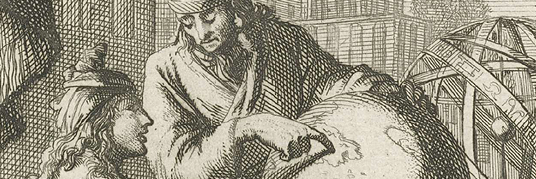 The Centre for Seventeenth-Century Studies at Durham University is seeking papers for a conference on Intellectual Networks in the Long Seventeenth Century (30 June–2 July 2013). The event – which will feature a keynote lecture from our own Howard Hotson – will ‘explore the emergence and consolidation of systems of intellectual and cultural exchange during the long seventeenth century, while assessing their lasting influence on the history of scholarship, literature, diplomacy, science, and religious communities’. Proposals are encouraged on (inter alia) erudite correspondence; academic networks; diplomacy; literary circles; intellectual exchange within religious communities; the book trade; women and intellectual exchange; and popular cultural exchange.
The Centre for Seventeenth-Century Studies at Durham University is seeking papers for a conference on Intellectual Networks in the Long Seventeenth Century (30 June–2 July 2013). The event – which will feature a keynote lecture from our own Howard Hotson – will ‘explore the emergence and consolidation of systems of intellectual and cultural exchange during the long seventeenth century, while assessing their lasting influence on the history of scholarship, literature, diplomacy, science, and religious communities’. Proposals are encouraged on (inter alia) erudite correspondence; academic networks; diplomacy; literary circles; intellectual exchange within religious communities; the book trade; women and intellectual exchange; and popular cultural exchange.
The deadline for proposals for 20-minute papers and full panels is 15 January 2013. For further details and submission instructions, head along to the conference webpage or download the flyer (pdf).
Edited by the Foundations of Modern Thought Research Centre at the University of Bucharest, and featuring our very own Howard Hotson on its Advisory Board, the new publication is billed as a ‘an interdisciplinary, peer-reviewed journal of intellectual history, dedicated to the exploration of the interactions between philosophy, science, and religion in Early Modern Europe’. The epistolary opener features seven contributions (as well as related review essays and book reviews) on particular correspondents and correspondence networks, including an article by Noel Golvers on Sino-European exchanges in the seventeenth and eighteenth centuries; Noel initiated our seminar series in 2010 with a wonderful paper on this topic (listen to the podcast). For full details and to order your copy, visit the journal webpage.
Philip Beeley
November 13, 2012
Front Page, Project Updates, Publications
Tags: Archives, Book History, Electronic Enlightenment, History of Medicine, History of Scholarship, History of Science, John Wallis, John Wilkins, London, Oxford, Ralph Bathurst, Respiration, Robert Boyle, Trinity College
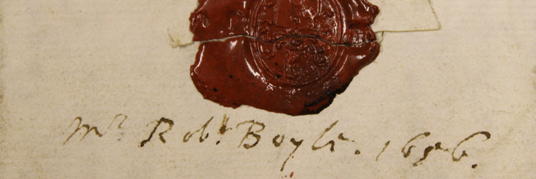
While ferreting around in the archives of Trinity College, Oxford finalizing annotations for Volume IV of The Correspondence of John Wallis, I came across a letter from Robert Boyle, the eminent natural philosopher, to the theologian and physician Ralph Bathurst, whose papers I was exploring. This manuscript was previously missing; while the letter is included in the monumental 2001 edition of Boyle’s complete correspondence (and can be consulted in Electronic Enlightenment), the editors had to base their text on a version of the letter in a 1761 print edition of Bathurst’s papers, rather than on this autograph original. Here’s the letter:
Trinity College Oxford Archive, Fellows 2/1/1: A new Boyle original. Images reproduced courtesy of Trinity College.
The missive – described by Boyle as a ‘hasty blotted scribble’ – is an intriguing one, shedding fascinating light on a failed publishing project. It was sent in April 1656, one of those Oxford months when lots of things were happening (even Henry Oldenburg was in town, inter alia, to sample the rich scientific culture developing in and around the university). Unfortunately for Oldenburg, two giants of the local philosophical scene were absent when he arrived. His friend Robert Boyle, who had moved to Oxford around the beginning of the year (and would stay on and off until 1668) had gone to London. Likewise in the metropolis was John Wilkins, the warden of Wadham College, who had gathered around him an illustrious circle of like-minded practitioners, including Seth Ward, Thomas Willis, and Wallis.
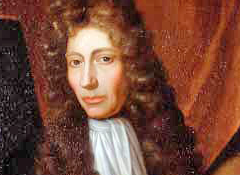
Sender Robert Boyle
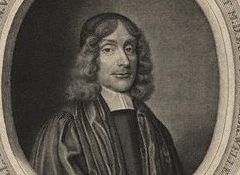
Recipient Ralph Bathurst
One of Boyle’s main tasks while in London was evidently to see through the press a promising book by Ralph Bathurst, one of the members of this glittering cadre of experimentalists. A fellow of Trinity College, who would go on to be College president and later vice-chancellor of the University, Bathurst had written three lectures on respiration as part of his examination as doctor medicinae in 1654; during the following two years, these texts were circulated scribally among the Wilkins circle, which evidently suggested revisions and emendations. Bathurst added numerous marginal notes to the manuscript of the Praescriptiones tres de respiratione and – notoriously reluctant to publish his work – was probably encouraged to do so by his celebrated friends. Boyle headed to the capital with the manuscript to spearhead the enterprise.
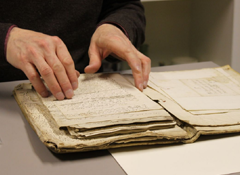
Bathurst’s letter book
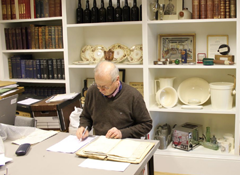
Objects and Letter-Objects
In the absence of Boyle and Wilkins (the two men who had promoted the venture most strongly), however, Bathurst began to get cold feet. Probably around the end of March, in a letter that is now lost he wrote to Boyle in London to inform him of his change of heart and to request that the manuscript be returned. Boyle did not receive the letter immediately, for he had been invited by Wilkins to inspect some peculiar natural phenomena elsewhere. Writing back to Bathurst in the April letter, Boyle expressed his disappointment at the ‘unwelcome orders you send me, concerning your excellent Lectures’, which presumably placed him in an awkward position. Indeed, Wilkins was evidently hoping to get plans back on track, and instructed Boyle not to follow Bathurst’s wish ‘to have those Jewells sent backe to Oxford’.
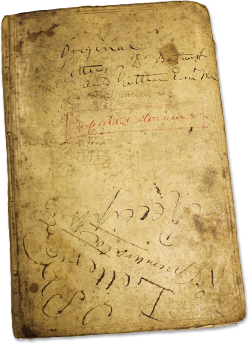 The efforts of Wilkins and Boyle to save the book were to no avail; Bathurst’s Praescriptiones tres de respiratione first saw light of day when it was published posthumously – alongside this letter – in Warton’s The Life and Literary Remains of Ralph Bathurst (London, 1761). The collapse of the project to publish Bathurst’s Praescriptiones illustrates the close relations between knowledge-makers in Oxford and London at this time. The incident even came to the attention of Samuel Hartlib, who recorded in his Ephemerides ‘Mr Boyle knows one that hath an excellent Ms. De Respiratione which hee will not publish’.
The efforts of Wilkins and Boyle to save the book were to no avail; Bathurst’s Praescriptiones tres de respiratione first saw light of day when it was published posthumously – alongside this letter – in Warton’s The Life and Literary Remains of Ralph Bathurst (London, 1761). The collapse of the project to publish Bathurst’s Praescriptiones illustrates the close relations between knowledge-makers in Oxford and London at this time. The incident even came to the attention of Samuel Hartlib, who recorded in his Ephemerides ‘Mr Boyle knows one that hath an excellent Ms. De Respiratione which hee will not publish’.
We are extremely grateful to Professor Michael Hunter for confirming the originality of this manuscript and for additional help and advice on its background.
James Brown
October 19, 2012
Conferences and Workshops, Events, Front Page, Podcasts, Project Updates, Publications
Tags: Animals, Charles Perrault, Comte de Buffon, Francis Willughby, Frogs, History of Medicine, History of Science, Insects, John Ray, Martin Lister, Natural History, Toads
The special issue publishes the proceedings of the day conference History Comes to Life: Seventeenth-Century Natural History, Medicine, and the New Science, organized by Anna Marie at The Royal Society in April (with the financial and logistical support of the project, The Royal Society, the Wellcome Trust, the John Fell Fund, and the BSHS). It features six fresh and fascinating articles from leading authorities on a wide range of topics at the intersection of seventeenth-century natural history, medicine, and science, including Buffon and animals, Francis Willughby and insects, and Jan Swammerdam’s abiding intellectual infatuation with frogs and toads. You can now enjoy early access to the articles online; the print version of the special issue will be available at the end of November. You can also listen to the podcasts from the conference. Congratulations to Anna Marie and the rest of the contributors!
James Brown
October 16, 2012
Conferences and Workshops, Events, Front Page, Project Updates
Tags: Book History, Global, History of Scholarship, History of Science, Libraries, Networks, News, Seventeenth Century, Union Catalogue
The event, organized by Rhodri Lewis and Noel Malcolm and attended by a record audience of over 100 delegates, assembled an all-star cast of eighteen international authorities on early modern letters, who over a three-day programme explored and celebrated the ways in which intellectual interests and activities of all kinds were pursued and propagated through correspondence during the long seventeenth century.
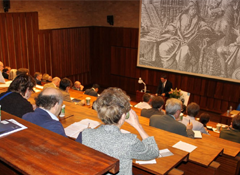
Rhodri welcomes delegates and introduces the conference themes
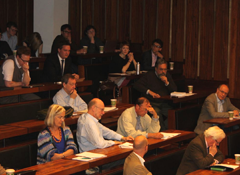
Our largest ever audience packs the lecture theatre
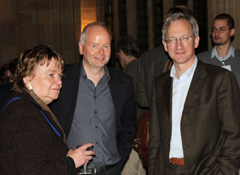
Constance Blackwell, Philip Beeley, and Howard Hotson
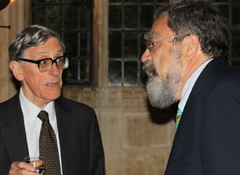
Sir Keith Thomas and Anthony Grafton at the Scaliger Reception
Particular attention was paid to the epistolary experiences of groups and networks rather than those of particular individuals – and the role of letters in constituting these communities of practice – and to the ways in which exchanges of letters coexisted with, supplemented, or competed with other kinds of knowledge production during the period. Delegates were also treated to a demonstration of our union catalogue of correspondence, Early Modern Letters Online (video now on our infrastructure page); no fewer than two publisher-sponsored drinks receptions toasting exciting new publications and partnerships (details here); and an array of quiches, sandwiches, and cakes of unusual deliciousness crafted by Trevor and Cristina from the Organic Deli Café.
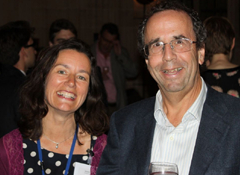
Miranda Lewis and Mordechai Feingold at the Scaliger Reception
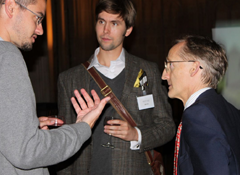
Leigh Penman, Alexander Farquhar, and Noel Malcolm
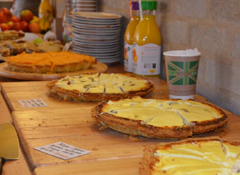
A conference marches on its stomach: artisan quiches
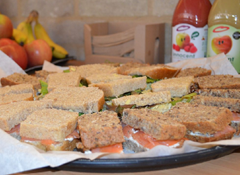
Sandwiches on home-made bread also exceeded scholarly expectations
Videos of most of the proceedings will be available shortly; in the meantime, for further information, including speaker profiles and abstracts, check out the conference microsite. Details of further events in 2013 and 2014 will also be available in the coming months; to stay informed, please join our mailing list.

 The
The 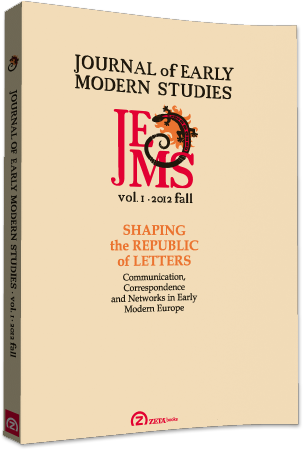

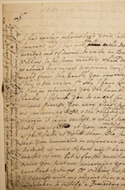
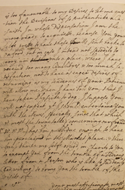
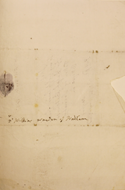
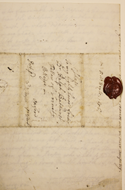




 The efforts of Wilkins and Boyle to save the book were to no avail; Bathurst’s Praescriptiones tres de respiratione first saw light of day when it was published posthumously – alongside this letter – in Warton’s
The efforts of Wilkins and Boyle to save the book were to no avail; Bathurst’s Praescriptiones tres de respiratione first saw light of day when it was published posthumously – alongside this letter – in Warton’s 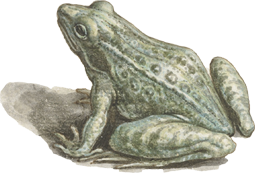 Our pertinacious (we’re running out of adjectives)
Our pertinacious (we’re running out of adjectives) 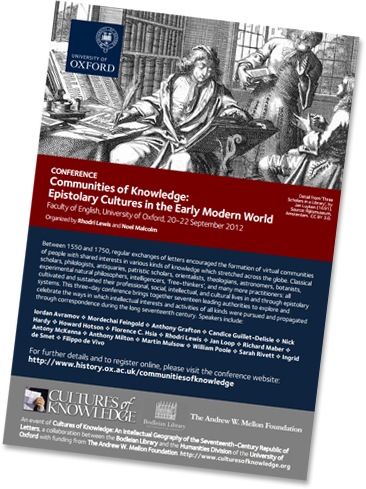









 Join
Join 